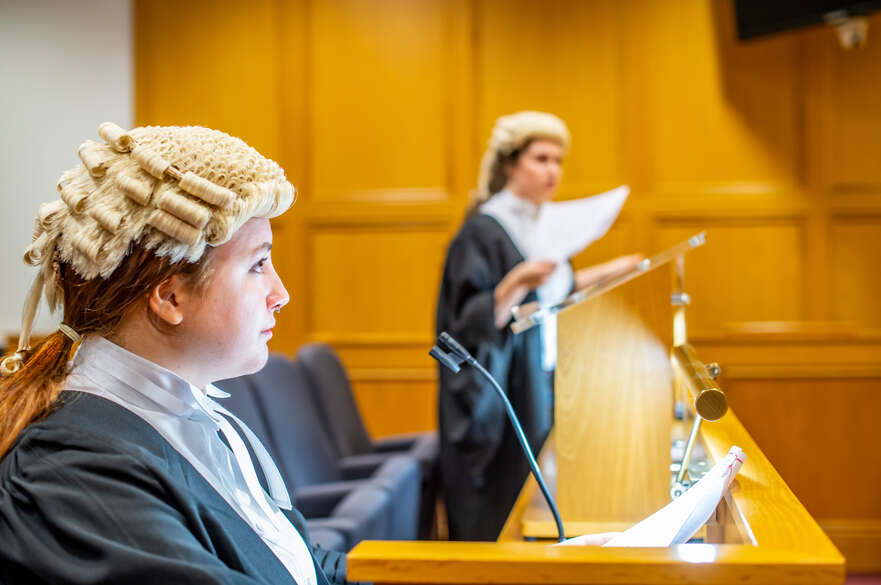Barristers Training Course PGDip
About this course
-
100% of NTU's research submitted to the Law Unit of Assessment was assessed to be world-leading or internationally excellent in terms of research impact (REF 2021).
Why choose this course?
For students who wish to study the BSB’s compulsory modules in a cost effective and time efficient manner, our Barristers Training Course (BTC) provides the necessary vocational training for the Bar in just six months. Successful completion of this course will enable you to achieve a Postgraduate Diploma and be called to the Bar. Perhaps you have already secured pupillage, are worried about taking too much time out of paid work or are concerned about accommodation costs? The BTC may be ideal for you.
Why study at Nottingham Law School?
- All our staff are experienced lawyers and you will benefit from their practical knowledge, as well as from our visiting lecturers.
- Our teaching is consistently commended as excellent.
- We teach in as small groups as possible to encourage student participation.
- We get to know our students and support and encourage you in both your studies and in your employment applications at the start of your legal career.
- We offer a multi-award-winning pro bono programme, including NLS Legal for the local community.
- Our dedicated and experienced careers consultants provide guidance and support to help you secure qualifying work experience or other legal employment. You'll benefit from working with our successful careers team.
- Alongside access to an exclusive BTC study area, studying with Nottingham Law School means that you have all the facilities a large Law School can offer plus the advantages of studying within a university environment which offers outstanding library, IT, support, sports, language and Student Union services.
- We have considerable expertise in advocacy and alternative dispute resolution. We're home to the first Centre for Advocacy in the UK and our Centre for Mediation and Dispute Resolution was opened in 2016 by Sir Peter Coulson, now a judge of the Court of Appeal.
- NTU is 3rd for number of PGT students studying Law (Latest HESA data 2021/22)
We are authorised by the Bar Standards Board (BSB) to deliver the vocational component of Bar training.
What you’ll study
The Barristers Training Course (BTC) is regulated by the Bar Standards Board (BSB) and offers you the opportunity to study the knowledge areas and skills set by the BSB.
The BTC is designed to build upon your knowledge and understanding of the law and develop the skills that you've gained during your previous legal studies. The course will enhance the attributes required to be an effective member of the Bar and demonstrate that you have met the requirements of the BSB's Professional Statement.
Following a two-week introductory period, which will include consideration of Legal Research and Case Analysis, you will handle seven realistic briefs (four criminal and three civil) from commencement to trial. Knowledge and skills are taught and learned through the progress of these case studies as you respond to instructions to Counsel.
Pervasives
- Case Preparation and Analysis
- Legal Research
Knowledge
- Civil Litigation and Evidence
- Criminal Litigation, Evidence and Sentencing
- Professional Ethics
Skills
- Advocacy
- Conference Skills
- Drafting
- Opinion Writing
Further information on what you'll study
Please be aware that all optional/elective modules are subject to availability, and NTU reserves the right to amend, change or withdraw modules at its discretion.
We regularly review and update our course content based on student and employer feedback, ensuring that all of our courses remain current and relevant. This may result in changes to module content or module availability in future years.
Don’t just take our word for it, hear from our students themselves
How you're taught
The six-month, full-time course is taught predominantly by way of practical small group sessions in high quality teaching accommodation, which includes impressive mock courtrooms. You'll be taught in groups of approximately 12 students, except for Advocacy and Conference where you will be taught in groups of six students.
Specific sessions are dedicated to the separate knowledge and skills areas. The course also adopts an integrated approach to the learning and teaching of the knowledge and skills areas through the use of briefs which replicate the reality of practice at the Bar and allow you to practice and experience case management from beginning to end.
Assessment
You will receive a percentage mark for each assessment and, on successful completion of the BTC modules, a transcript containing your overall aggregate.
Two of the knowledge modules are assessed by way of assessments that are centrally set by the BSB and comprise of multiple choice and single best answer questions. These modules are:
- Civil Litigation and Evidence (one closed book paper and one open book); and
- Criminal Litigation, Evidence and Sentencing (one closed book paper).
Professional Ethics is the other key knowledge area on the BTC and is assessed by way of short answer questions set by Nottingham Law School.
Skills assessments are set by Nottingham Law School with criteria provided by the BSB. They are practical in nature, and designed to allow you to demonstrate competence against specific criteria relevant to the skill. Typically, the assessments are set in the context of briefs or instructions to Counsel.
Research informed teaching
By daring to think differently our research is tackling real-world issues. The subjects you will study with us are informed by our research so you can be sure your knowledge will be cutting-edge in your field. In the last Research Excellence Framework (REF 2021) - the UK's system for assessing the quality and impact of research in universities - we’re proud that 100% of NTU's Law submission was assessed to be world-leading or internationally excellent.
Careers and employability
Your future career
Successful completion of this course enables you to proceed to be called to the Bar and proceed to pupillage. We have a dedicated careers and placement service who will support you in your search for both pupillage and alternative employment. The team provides practical sessions and advice.
The team offers advice and practical support, such as mock interviews. A number of presentations are given throughout the year reflecting the changing needs of students as they progress through the application process. The focus of these presentations is on both practice at the Bar, which reflects the ambitions of most of the students, and alternative careers.
Students should view careers advice as something about which any BTC tutor can be approached. All teaching staff come from practice, some from London and some from the local area, and some retain tenancies in Chambers. We are thus able to offer first-hand advice and guidance to students.
A number of local Chambers have been enthusiastic in their support for the course and our students and former students are represented amongst those they recruited as pupils with a view to tenancy.
Continuing professional development
Nottingham Law School also offers a suite of practice-based practitioner programmes specifically designed to meet the personal development needs of legal practitioners. We offer courses that qualify for continual professional development (CPD), in-house training and bespoke programmes. These courses are highly flexible and can be delivered throughout the year both nationally and internationally.
Placements are not part of the course, although there are opportunities to gain legal experience through pro bono projects. We also run the successful NLS Legal and strongly advise students to get involved in these activities.
Links with the profession
In addition to the programme of guest lectures and practitioner workshops that run during the year, we give you further opportunities to experience life at the Bar, and to meet practitioners. Examples of these opportunities include:
- Welcome reception – at the beginning of the course, we arrange a social event attended by the Bar and Judiciary.
- 1 High Pavement Plea in Mitigation Competition – 1 High Pavement is a leading criminal set which sponsors our annual Plea in Mitigation Competition.
The competition is judged by members of Chambers. - Ropewalk Chambers Mooting Competition – Ropewalk Chambers, a leading specialist civil set in Nottingham, sponsors the mooting competition, which is judged by members of Chambers.
Campus and facilities
Entry requirements
UK students
Academic entry requirements
You will need one of the following options:
- Qualifying Law degree (2.1).
- Graduate Diploma in Law / CPE with an undergraduate honours degree (2.1)
- A 2.2 honours degree will be considered with evidence of exceptional achievement elsewhere in the application e.g. awards, scholarships, work experience – paid or unpaid.
All applicants should provide evidence in their personal statement of their commitment to a career in law and will be required to provide a full reference in support of their application.
Additional requirements for UK students
Certificate of Academic Standing (CAS)
Anyone with non-standard qualifications is required to present a Certificate of Academic Standing (CAS) from the Bar Standards Board before they enrol on the Barristers Training Course. Full details of who is required to obtain this Certificate can be found on the Bar Standards Board website.
Inns of Court
It is an enrolment requirement of the Barristers Training Course that you must join an Inn of Court before you can begin studying on the programme. For more details, including deadlines and fees please contact the relevant Inn:
Recognition of Prior Learning
NTU may admit a student with advanced standing beyond the beginning of a course, through an assessment of that student's prior learning, whether it is certificated or uncertificated. Our Recognition of Prior Learning and Credit Transfer Policy outlines the process and options available to these prospective students, such as recognising experiential learning or transferring to a similar course at another institution, otherwise known as credit transfer.
All prospective students who wish to apply via Recognition of Prior Learning should initially contact the central Admissions and Enquiries Team who will be able to support you through the process.
Getting in touch
If you need more help or information, get in touch through our enquiry form
International students
Academic entry requirements
You will need one of the following options:
- Qualifying Law degree (2.1).
- Graduate Diploma in Law / CPE with an undergraduate honours degree (2.1)
- A 2.2 honours degree will be considered with evidence of exceptional achievement elsewhere in the application e.g. awards, scholarships, work experience – paid or unpaid.
All applicants should provide evidence in their personal statement of their commitment to a career in law and will be required to provide a full reference in support of their application.
Additional requirements for international students
Certificate of Academic Standing (CAS)
Anyone with non-standard qualifications is required to present a Certificate of Academic Standing (CAS) from the Bar Standards Board before they enrol on the Barristers Training Course. Full details of who is required to obtain this Certificate can be found on the Bar Standards Board website.
Inns of Court
It is an enrolment requirement of the Barristers Training Course that you must join an Inn of Court before you can begin studying on the programme. For more details, including deadlines and fees please contact the relevant Inn:
Recognition of Prior Learning
NTU may admit a student with advanced standing beyond the beginning of a course, through an assessment of that student's prior learning, whether it is certificated or uncertificated. Our Recognition of Prior Learning and Credit Transfer Policy outlines the process and options available to these prospective students, such as recognising experiential learning or transferring to a similar course at another institution, otherwise known as credit transfer.
All prospective students who wish to apply via Recognition of Prior Learning should initially contact the central Admissions and Enquiries Team who will be able to support you through the process.
English language requirements
It is a requirement of the BTC that students are fluent in English. Applicants need to be able to demonstrate that their English language ability is equivalent to a minimum score of 7.5 in each element of the IELTS test.
International students will be required to produce a certificate evidencing the necessary IELTS scores or equivalents* unless they have:
- An actual or predicted degree classification of 2.1 or above in a degree undertaken in the UK and awarded by a UK institution;**
- An actual or predicted commendation or above in the GDL undertaken in the UK and awarded by a UK institution; or
- An actual or predicted commendation or above in a taught Masters undertaken in the UK and awarded by a UK institution.
- Pearson Test of English (Academic)
- TOEFL
- KTE (Kaplan Test of English).
You may be entitled to £200 towards the cost of an English Language Test
This would be subject to the following terms and conditions as outlined below:
- You will need to have applied to join the LLM BTC or PG Dip BTC starting in September 2025.
- An English Language test (IELTS, PTE, TOEFL) is required as part of the conditional offer.
- NTU would only cover the cost of one successful test (not any unsuccessful sits), taken between 1 October 2024 - 31 July 2025, and the reimbursement would be paid after you have fully enrolled to the course.
- Applicants who do not to enrol at NTU in September 2025 will not be eligible for reimbursement. This includes students who have not met the conditions of their offer, or who have not chosen to accept their offer and enrol with NTU.
- Applicants must be classed by NTU as International students for fee-assessment purposes.
Find out more about our English language requirements for International students: English language requirements.
Help and support
If you have any questions about your qualifications or about making an application to the University please contact our international team for advice.





